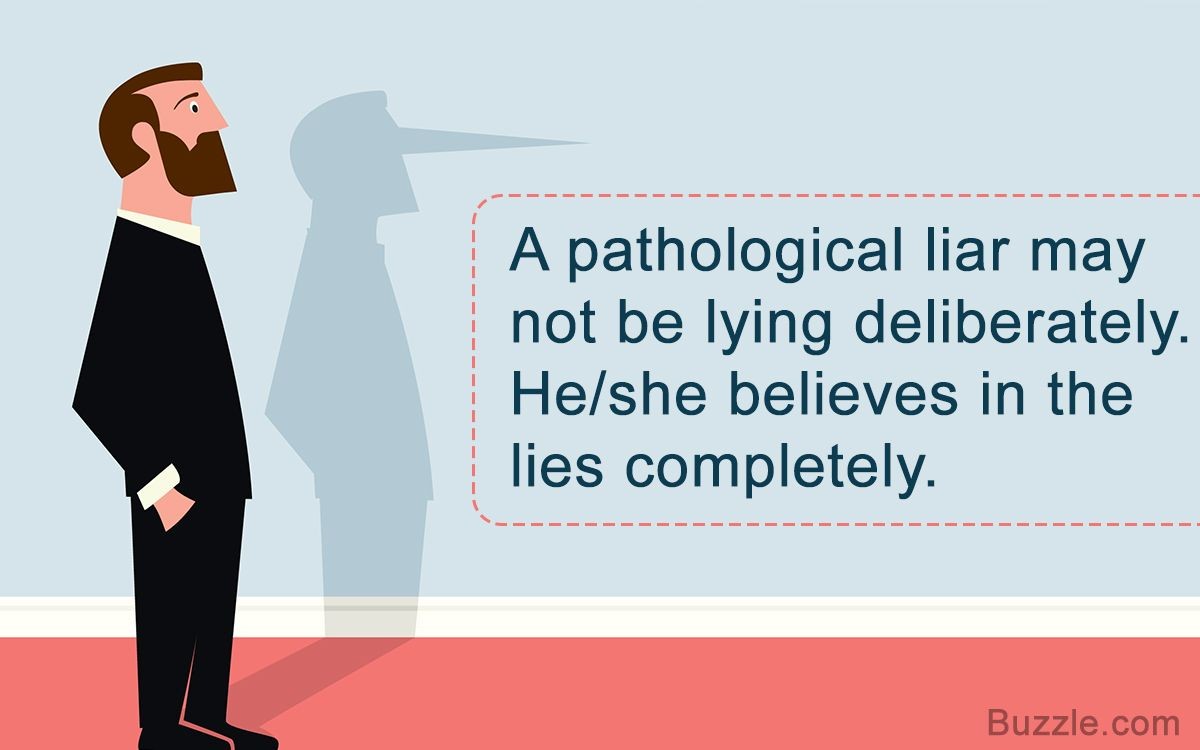
Contents
- 1 What Is the Difference Between a Pathological Liar and a Compulsive Liar?
- 1.0.1 What are the three types of liars?
- 1.0.2 How to identify signs of pathological lying
- 1.0.3 What causes pathological liars to lie?
- 1.0.4 Treatment for compulsive and pathological liars
- 1.0.5 Can a pathological liar love someone?
- 1.0.6 What is the difference between white lies and pathological lies?
- 1.0.7 Can pathological liars have relationships?
What Is the Difference Between a Pathological Liar and a Compulsive Liar?
A pathological liar lies to get their way and does so with little awareness. A compulsive liar lies out of habit.
Below are the differences or symptoms between compulsive and pathological liars.
Pathological liar
A liar lies to get their way and does so with little awareness.
- It is a coping mechanism developed in early childhood and is often associated with a mental health disorder like an antisocial personality disorder. They may lie to avoid something traumatic or it may be genetic.
- Pathological liars often have an antisocial personality disorder (APD) and narcissistic personality disorder (NPD).
- A pathological liar is often goal-oriented and has little regard for the rights and feelings of others.
- They are considered manipulative and cunning.
- They create extravagant stories that may be maintained or tweaked over time, and they often believe their lies or have a weak grip on reality.
- Unlike compulsive liars, pathological liars are near impossible to catch in the act. They lie constantly and make unnecessary stories, making it difficult to distinguish the truth from false statements.
- Pathological liars are confident while lying and use their lying trait as a defense mechanism.
- Some symptoms of a pathological liar include lying to gain something, exaggerating things, constantly changing stories, and living in a false sense of ‘reality.’ They act defensive if confronted and hold no value for the truth.
Compulsive liar
A liar who lies out of habit.
- Compulsive liars lie about everything, large or small. Telling the truth is awkward and uncomfortable for them, while lying feels right.
- Compulsive lying usually develops in early childhood due to being in an environment where lying was necessary and routine.
- They lie to avoid confrontations with the truth.
- Compulsive liars may or may not have a mental disorder, often associated with ADHD, bipolar disorder, and borderline personality disorder.
- Compulsive liars are not manipulative and cunning like pathological liars. They simply lie out of habit, which is hard to break and takes a toll on relationships.
- Compulsive liars’ stories usually do not add up, and they display classic lying behaviors like avoiding eye contact and stumbling over words.
- They often lie for no clear reason, make lies up spontaneously, and tell the lies they think people want to hear.
- They know the difference between reality and lies and are more likely to admit to lying when confronted.
What are the three types of liars?
There are three main types of liars.
- Natural liars – These are people who can lie easily with great success and skills. They don’t believe their own lies; they’re just good at lying.
- Pathological liars – Pathological lying is often a warning sign of antisocial personality disorder. A pathological liar is considered manipulative and cunning.
- Compulsive liars – They lie about everything out of habit. Telling the truth is awkward and uncomfortable for them, while lying feels right.
How to identify signs of pathological lying
It can be difficult to spot pathological lying. People who do it are so accustomed to telling lies that they may not even be aware of their actions. They may even have a great personality on the outside.
Some traits of a pathological liar may include:
- Lying about insignificant details
- Tendency to contradict themselves
- Lack of regret regarding how their lies affect others
- Defensive or angry when confronted, even with proof
What causes pathological liars to lie?
Studies have shown that pathological liars have more white matter in their prefrontal cortex, the front part of the brain.
White matter is linked to faster connections, linguistic fluency, and thought processing, which could explain why someone with more white matter would be prone to lying.
Treatment for compulsive and pathological liars
The success of treatment depends on whether the person acknowledges their behavior as a ‘compulsive liar’ or ‘pathological liar’.
Treatment options may include:
- Psychotherapy
- Counseling
- Antipsychotic medications
- Family support, along with treatment, is beneficial.
Treatment options may be used in combination, depending on the underlying psychiatric condition.
Can a pathological liar love someone?
While lying occasionally is normal, pathological liars go beyond that. They lie for no apparent reason, and lying becomes ingrained in them.
Although pathological liars may be able to love someone, it is often difficult for them to maintain an honest and healthy relationship. This can result in toxic relationships that cause stress and hurt to their partners.
What is the difference between white lies and pathological lies?
White lies are often told to avoid hurting someone’s feelings or getting out of uncomfortable situations. These lies are usually innocuous and sometimes even necessary. For example, complimenting your host’s cooking even if you don’t like it is harmless and shows social intelligence.
However, pathological liars often lack empathy and their lies are more calculated, often causing harm to their victims. Pathological liars are frequently motivated by selfish desires and lie to manipulate others.
Some pathological liars struggle with long-term careers and tend to change jobs and relationships frequently as their lies catch up with them.
Can pathological liars have relationships?
Being in a relationship with a pathological liar can be exasperating. It may be difficult to trust them, especially if you notice a pattern in their lies and deceit.
If you believe you’re dealing with a compulsive liar, the following tips can help you cope:
- Call them out: Let the liar know that you’re aware of their lies. Stay calm and help them understand why they’re lying. Encourage them to seek help outside the relationship.
- Don’t debate: Debating with someone who lives in a dream world won’t change them. Starting a fight with someone who may not even be aware of what they’re doing won’t help anyone.
- Walk away: If a pathological liar continues to deceive despite your concerns, ending the relationship may be necessary. Lies are devastating to a relationship, and they need to understand the consequences.
- Seek professional help: Professional help can assist pathological liars in addressing deep-seated issues. Depending on the underlying mental disorder, treatment may include psychotherapy, medication, or both. Couples counseling may be beneficial for romantic relationships.


